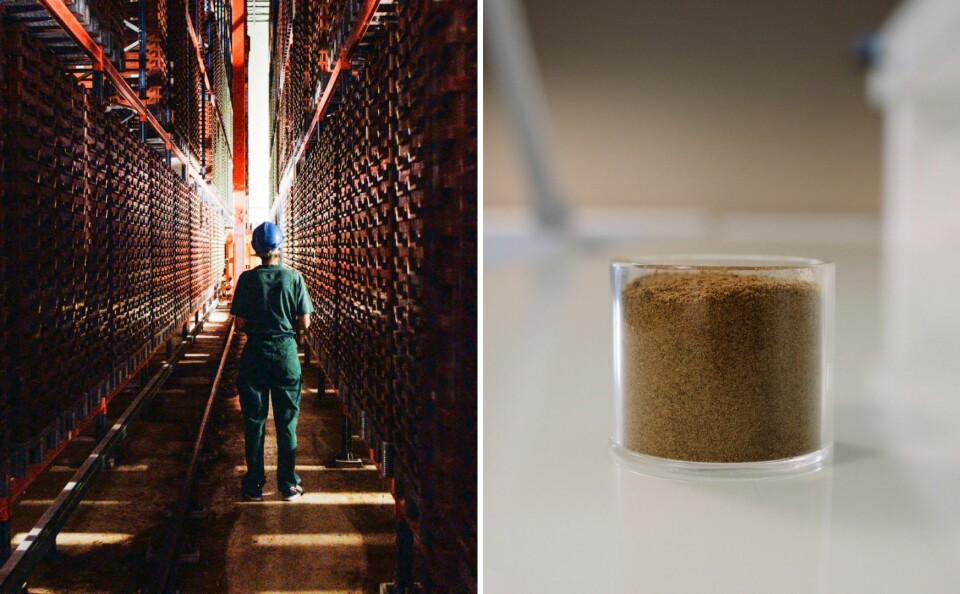-
Digital ID to be accepted at French airports this summer
Scheme not open to non-French residents despite plans to include certain card holders by the end of 2025
-
AI usage on the rise in France but lags behind UK and US
Uptick in generative AI usage outpaces smartphone and internet adoption across similar timeframe
-
More communes in France distribute Asian hornet traps
Residents are increasingly receiving help, with now the best time to capture the queens
Grub’s up: Insect farming for human food is French success story
How France has become a global leader in insect protein production and where you might eat it

France is leading the way in modern insect farming.
The largest company in the sector, Ynsect, has signed up to build factories in the United States and Mexico, as well as receiving European Union approval for its products to be sold as human food.
It already has a factory in Dole (Jura), another in the Netherlands, and one being built near Amiens (Somme).
Its main product, a high-protein flour, has been approved as a food by the EU and is already on the shelves of some supermarkets and sports shops, mainly in the form of protein bars for athletes.
Read more: Beetle burger anyone? French firm allowed to cook with Buffalo beetles
Slight burnt cereal flavour
Company spokeswoman Anaïs Maury said: “We sell the flour, as well as an oil from the insects, to other businesses, not to the public, and they decide what products it goes into.
“Protein bar makers have been the first to use it because the flour is an almost direct replacement for whey powder [whey is a by-product of cheese-making], which provides much of the protein now.”
In its raw state, the insect flour looks a bit like buckwheat flour and is virtually tasteless.
“People who try it, knowing it is made from insects, sometimes say they can taste a slight burnt cereal flavour.
“Others find a peanut flavour but the taste is very slight and not noticeable when it is mixed in with other ingredients,” Ms Maury said.
The oil can be used as a replacement for palm oil, with the added benefit of containing more Omega 3. That, too, is neutral in taste, with most people unable to distinguish it from rapeseed oil.
Clearly labelled ‘insect protein’ on packets
Approval as a food for humans was obtained in 2021, and many manufacturers have been experimenting since then with how best to use Ynsect products.
“As well as sports bars, most of the interest has been from people trying to make meat- substitute burgers and things like that, so that might well be where most readers eat it for the first time,” said Ms Maury.
“Our meal has a very low carbon footprint compared to cattle production, which makes it attractive for people who want to do their bit to help fight climate change.”
However, it cannot be included alongside products aimed at vegans or vegetarians – the fact it contains ‘insect protein’ is listed clearly on packets.
Read more: Paris start-up creates 100% meat-free ‘lardon’ bacon
One lifelong vegetarian, Florence Collins from Nièvre, said the idea of eating insects was no better than eating farm animals but she did concede that other vegetarians may not feel the same.
“People do not become vegetarian only for ethical reasons, but also for ecological and health ones, and food lobbies can be so persuasive.”
Insect faeces used as organic fertiliser
The meal is also used as animal feed and has approvals for fish farming and pig food, with more animal feed uses expected in future.
It is produced from mealworm larvae, which are fed wheat bran.
This means the factories making the meal are almost always in cereal-producing areas, often near flour mills.
The whole process of hatching eggs, feeding the mealworms, and then harvesting the larvae by gassing them is done on site.
The factories are approximately 40 metres tall – about the height of a grain silo – and each one produces around 200,000 tonnes of meal a year.
Faeces from the insects is collected and used as fertiliser on organic farms.
Prices of the meal and oil are similar to whey and palm oil.
Early research and state funding puts France ahead
As well as Ynsect, there are two other large French companies, called Agronutris and InnovaFeed, producing protein meal from insects, plus a handful of smaller ones.
Both Agronutris and InnovaFeed raise black soldier flies instead of mealworms, and get their meal and an oil from the maggots.
At present, their products are aimed solely at the animal feed market.
InnovaFeed recently raised €250million and also hopes to build factories in the US where it has close links with food giants Cargill and ADM.
Ms Maury said a number of factors have led to France becoming a global leader in insect protein production.
“Research has been carried out for decades in French and Dutch universities, aimed at creating systems for industrial production,” she said.
“A second factor is that we had support, both from venture capital and the state.
“This let us prove the concepts and build pilot factories, and when they worked, other financers came on board too.
“France is often criticised for lagging behind in agricultural innovation, but in this case it has done very well indeed.”
Related articles
Algae farm windows help French flats go green
Buses in southern France use rapeseed oil to lower pollution and costs
Plant-based food can be called a ‘steak’ in France, court rules
























